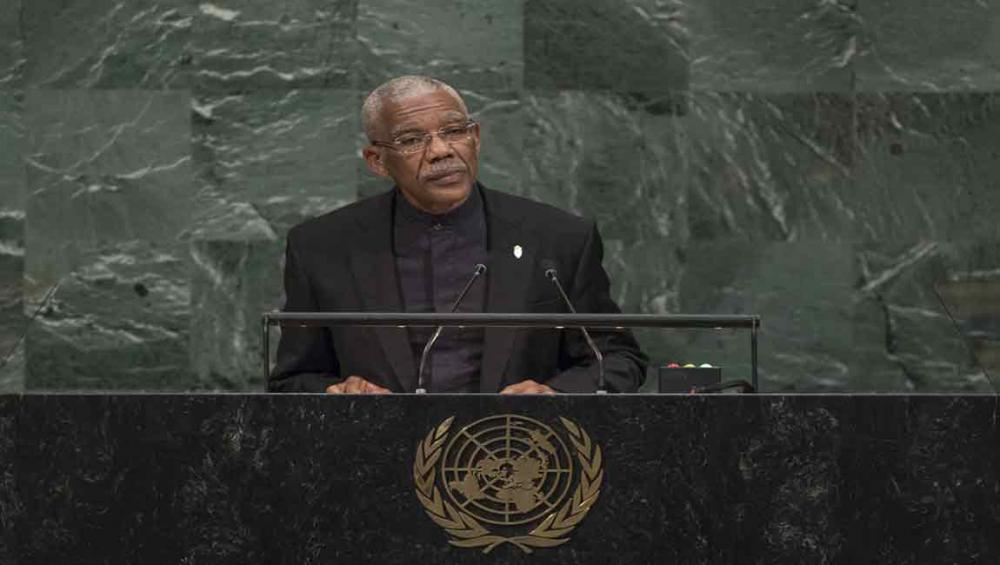Just Earth News | @justearthnews | 22 Sep 2017, 07:28 am Print

Cia Pak
Underscoring the importance of the Sustainable Development Goals (SDGs), David Granger, the President of Guyana, said that the Goals represent the international community’s collective desire and determination to eradicate hunger and poverty, and ensure equal opportunities in education, employment and social justice for both men and women.
However, advancement of these Goals, he noted, is obstructed by violations of human rights, as well as by conflicts and violence that is displacing many from their homes, adding that the challenge before the UN is “to resolve to reinforce respect for the rights of citizens within the governance structures of [its] Member States.”
He also underscored the need to combat the impact of climate change, and expressed his country’s commitment to the Paris Agreement on climate change.
“Climate change is not a fiction of a few extremists,” said the President, noting that most recently, Caribbean islands and North American countries had felt the devastating impact of five successive hurricanes.
Also in his remarks, the Guyanese President reiterated that humanity must continue to striving for peace and highlighted the important role the UN through the International Criminal Court and the Security Council have in ensuring peace and respect for justice.
“Peace for the world’s peoples is the mandate of the UN. It can be achieved by addressing the world’s humanitarian crises, promoting justice within and between nations and resolving long-standing conflicts between states,” he concluded.
Also speaking on Thursday, Horacio Manuel Cartes Jara, the President of Paraguay, underscored the importance of the UN in confronting global challenges such as poverty and inequality, climate change, transnational crime, drug trafficking and terrorism.
Reaffirming his country’s commitment for the implementation of the Paris Agreement, President Cartes Jara urged all States, and in particular those with greater responsibility for greenhouse gas emissions, to take all necessary measures to preserve the planet from the consequences of global warming.
“In Paraguay, we have taken a social responsibility perspective, by fostering greater production of clean and renewable energy,” he said.
The President also informed the Assembly of Paraguay’s efforts to implement the 2030 Agenda for Sustainable Development, including building an innovative and inclusive institutional architecture to advance progress towards the SDGs and targets.
He also spoke of work in his country to combat poverty, build opportunities for the indigenous and rural communities, promote greater investments, as well as increase transparency and efficiency in Government processes.
Turning to the crisis emanating from the nuclear weapon development programme of the Democratic People’s Republic of Korea, the President reiterated Paraguay’s condemnation of the nuclear tests conducted by the DPRK, in clear defiance of its international obligations, and urged a “firm rejection” by the UN General Assembly of such acts by the country.
Also addressing the General Assembly on Thursday, President Lenín Moreno Garcés of Ecuador said the road to achieving peace and successfully implementing the SDG’s depends on cooperation and dialogue.
Reflecting on misuse of resources, the President asked: “How could it be possible that resources allocated to implementing the SDG’s have been wasted on the absurdity of war?”
He added that fallout from conflicts extends beyond economic damages – they also rob people of “true freedom and democracy.”
For this reason, he said, it is important to respect sovereignty of States and reject the notion that militarism is the solution, which, he stressed “brings suffering, pain and death.”
Also in his remarks, Garcés informed the General Assembly of a temporary bilateral ceasefire signed just a few days ago in the Ecuadorian capital, Quito, between Government of Colombia and an armed group, as an example of regional strides towards achieving peace.
In conclusion, the President expressed optimism about coexisting in “a more human, and just world,” can be attributed to the power of dialogue, political decision-making power, and collective action.
- US official reacts to Elon Musk's remarks backing India's permanent UNSC seat
- Sri Lanka: 6.2 magnitude earthquake hits Island Nation, no casualty
- UN chief hails SE Asia for vital role ‘building bridges of understanding’
- India-Uzbekistan Synergy at the SCO
- Kazakhstan to host Astana International Forum in June to address key global challenges






